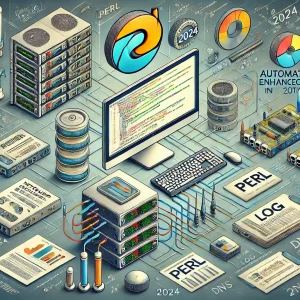In the evolving landscape of system programming, the need for languages that prioritize both safety and efficiency has become paramount. Traditional system programming languages like C and C++ have long dominated this domain. However, they often come with significant risks related to memory safety, leading to vulnerabilities and security issues. Enter Rust, a modern programming language designed to address these challenges head-on. In this blog, we’ll delve into the intricacies of Rust programming for safe and efficient system programming 2024.
Introduction to Rust
Rust is a systems programming language that emphasizes safety and performance. It was originally developed by Mozilla and has quickly gained traction in the developer community due to its innovative approach to memory management. Unlike C and C++, Rust guarantees memory safety without needing a garbage collector, making it a compelling choice for systems programming. As we explore Rust programming for safe and efficient system programming 2024, it’s clear that Rust’s features align perfectly with the needs of modern system developers.
Key Features of Rust
- Memory Safety Rust’s ownership system is its most lauded feature. It ensures that all memory accesses are safe and free from common bugs such as null pointer dereferencing and buffer overflows. The ownership model enforces strict rules on how memory is accessed and managed, significantly reducing the risk of memory-related vulnerabilities. This makes Rust programming for safe and efficient system programming 2024 an excellent choice for developers looking to enhance the reliability of their software.
- Concurrency Rust provides powerful concurrency primitives while preventing data races at compile time. This is achieved through its ownership and type system, which enforces safe concurrency practices. In a world increasingly reliant on multi-core processors, Rust’s approach to concurrency is both timely and essential. This aspect of Rust programming for safe and efficient system programming 2024 ensures that developers can build robust multi-threaded applications without compromising on safety.
- Performance Rust’s performance is comparable to C and C++ due to its zero-cost abstractions. This means that developers can write high-level, expressive code without sacrificing performance. Rust achieves this through meticulous compile-time checks and optimizations, reinforcing the value of Rust programming for safe and efficient system programming 2024.
- Tooling and Ecosystem Rust boasts a robust ecosystem with a rich set of tools that enhance developer productivity. Tools like Cargo (Rust’s package manager and build system), rustfmt (code formatter), and Clippy (linting tool) make it easier to maintain and manage Rust projects. Additionally, the Rust community is vibrant and supportive, contributing to a growing ecosystem of libraries and frameworks. These tools play a crucial role in facilitating Rust programming for safe and efficient system programming 2024.
Rust in System Programming
System programming involves writing software that interacts closely with the hardware, such as operating systems, device drivers, and embedded systems. Rust’s features make it an excellent fit for these tasks. Let’s explore some key areas where Rust programming for safe and efficient system programming 2024 shines.
Operating Systems
Rust has been successfully used in the development of several operating systems. For instance, the Redox OS is a Unix-like operating system written entirely in Rust. Rust’s safety guarantees help prevent many of the bugs that plague traditional operating systems, making it a strong candidate for OS development. This exemplifies Rust programming for safe and efficient system programming 2024 in creating more secure operating systems.
Embedded Systems
Embedded systems require efficient, low-level access to hardware, often with stringent resource constraints. Rust’s performance characteristics and safety features make it an ideal choice for embedded programming. Projects like Tock OS demonstrate Rust’s capability in this field, providing a secure and reliable platform for embedded applications. The relevance of Rust programming for safe and efficient system programming 2024 in embedded systems is evident in its growing adoption.
Networking and Protocols
Network programming often involves handling untrusted input and managing complex state machines, making it prone to security vulnerabilities. Rust’s strong type system and memory safety guarantees help mitigate these risks. Projects like Hyper (a fast HTTP library) and Tokio (an asynchronous runtime) showcase Rust’s prowess in building safe and efficient networked applications. Thus, Rust programming for safe and efficient system programming 2024 proves invaluable in networking.
Benefits of Using Rust
- Reduced Security Vulnerabilities Rust’s ownership model and compile-time checks ensure that many classes of bugs, such as use-after-free and data races, are caught early in the development process. This leads to more secure and reliable software, underscoring the importance of Rust programming for safe and efficient system programming 2024.
- Improved Developer Productivity While Rust’s learning curve can be steep due to its strict safety guarantees, developers often find that the language’s rigor pays off in the long run. The elimination of certain classes of bugs reduces the need for extensive debugging and testing, speeding up the development cycle. This benefit is a core aspect of Rust programming for safe and efficient system programming 2024.
- High Performance Rust’s performance is on par with C and C++, making it suitable for performance-critical applications. Its zero-cost abstractions allow developers to write expressive code without incurring runtime overhead. This ensures that Rust programming for safe and efficient system programming 2024 does not compromise on performance.
- Strong Community and Ecosystem The Rust community is known for its friendliness and inclusivity. This, coupled with a growing ecosystem of libraries and tools, makes it easier for developers to adopt and integrate Rust into their projects. The community support enhances the experience of Rust programming for safe and efficient system programming 2024.
Challenges of Adopting Rust
Despite its many advantages, adopting Rust is not without challenges. Understanding these can help organizations and developers make informed decisions about Rust programming for safe and efficient system programming 2024.
- Learning Curve Rust’s ownership model and strict compile-time checks can be daunting for developers accustomed to other languages. However, once mastered, these features significantly enhance code safety and reliability, justifying the initial effort required for Rust programming for safe and efficient system programming 2024.
- Toolchain Maturity While Rust’s tooling is robust and continually improving, it may not yet match the maturity of long-established languages like C and C++. Certain niche areas might still lack comprehensive libraries or tools. However, the continuous development in this area shows promise for Rust programming for safe and efficient system programming 2024.
- Integration with Existing Codebases Integrating Rust into existing projects written in other languages can be challenging. However, Rust’s FFI (Foreign Function Interface) allows for interoperability with C, easing the transition process. This facilitates Rust programming for safe and efficient system programming 2024 in diverse environments.
Case Studies
Several high-profile projects and companies have adopted Rust, showcasing its benefits in real-world scenarios, highlighting Rust programming for safe and efficient system programming 2024.
- Mozilla Mozilla, the creator of Rust, uses the language in several of its projects. For example, the Firefox browser incorporates Rust components to enhance performance and security. The Servo project, a browser engine written in Rust, aims to leverage Rust’s safety guarantees to create a more secure browsing experience, demonstrating Rust programming for safe and efficient system programming 2024.
- Microsoft Microsoft has adopted Rust for parts of its Azure cloud platform. Rust’s safety and performance characteristics make it well-suited for building reliable and efficient cloud services. This adoption showcases the practical applications of Rust programming for safe and efficient system programming 2024.
- Amazon Amazon Web Services (AWS) uses Rust in various components, particularly for performance-critical tasks. Rust’s ability to deliver high performance with strong safety guarantees aligns with AWS’s needs for reliable cloud infrastructure, exemplifying Rust programming for safe and efficient system programming 2024.
The Future of Rust in System Programming
As we move into 2024, Rust’s adoption in system programming is poised to grow. Its unique combination of safety and performance makes it an attractive choice for a wide range of applications. The continued evolution of the Rust ecosystem, along with increasing industry adoption, will likely drive further innovation and improvement in system programming practices, solidifying the role of Rust programming for safe and efficient system programming 2024.
Conclusion
Rust programming for safe and efficient system programming 2024 represents a significant step forward in addressing the challenges of modern system development. With its strong focus on memory safety, concurrency, and performance, Rust offers a compelling alternative to traditional system programming languages. As more projects and companies embrace Rust, its impact on the software development landscape will continue to expand, making systems programming safer and more efficient for everyone.
By understanding Rust’s features, benefits, and challenges, developers and organizations can make informed decisions about adopting this powerful language for their system programming needs. Whether building operating systems, embedded systems, or networked applications, Rust programming for safe and efficient system programming 2024 provides the tools and guarantees needed to create robust, high-performance software.





